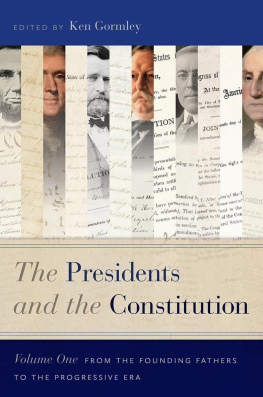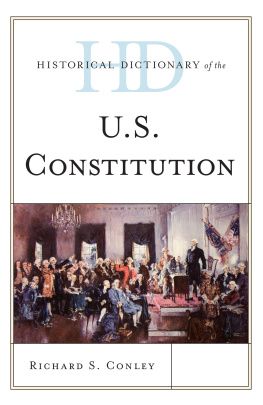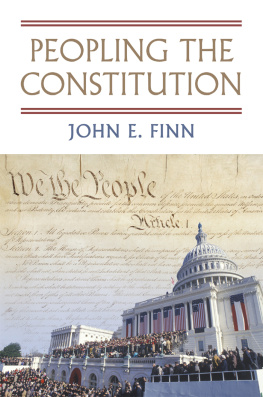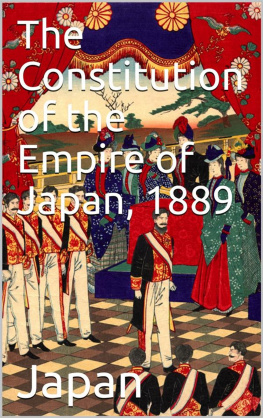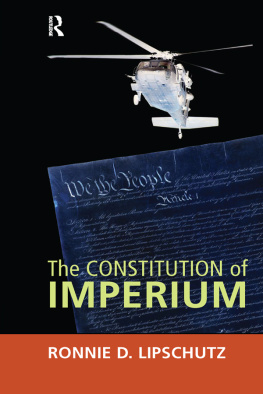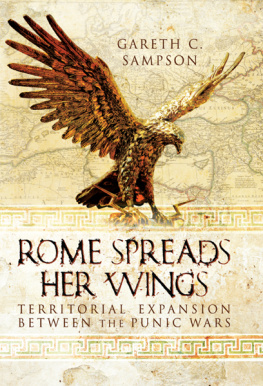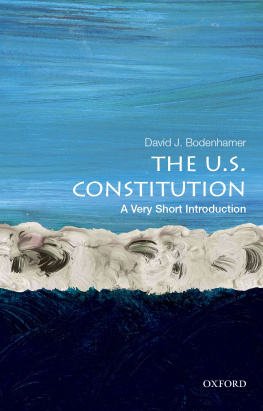The Constitution of Empire
GARY LAWSON
AND GUY SEIDMAN
The Constitution of Empire
TERRITORIAL EXPANSION AND AMERICAN LEGAL HISTORY

Copyright 2004 by Yale University. All rights reserved. This book may not be reproduced, in whole or in part, including illustrations, in any form (beyond that copying permitted by Sections 107 and 108 of the U.S. Copyright Law and except by reviewers for the public press), without written permission from the publishers.
Printed in the United States of America by Sheridan Books, Ann Arbor, Michigan.
Library of Congress Cataloging-in-Publication Data
Lawson, Gary, 1958
The constitution of empire : territorial expansion and American legal history / Gary Lawson and Guy Seidman.
p. cm.
Includes bibliographical references and index.
ISBN 0-300-10231-3 (cloth : alk. paper)
1. United StatesTerritorial expansion. 2. United StatesPolitics and governmentPhilosophy. 3. United StatesTerritories and possessionsPolitics and government. 4. ImperialismHistory. 5. Constitutional historyUnited States. 6. Constitutional lawUnited States. I. Seidman, Guy. II. Title.
E179.5.L36 2004
342.73413dc
22 2003016909
A catalogue record for this book is available from the British Library.
The paper in this book meets the guidelines for permanence and durability of the Committee on Production Guidelines for Book Longevity of the Council on Library Resources.
10 9 8 7 6 5 4 3 2 1
To Patty, Nathaniel, and Noah Lawson
To Ady and in loving memory of Lea Seidman
Contents
Acknowledgments
Portions of this book appeared previously in Gary Lawson and Guy Seidman, The First Establishment Clause: Article VII and the Post-Constitutional Confederation, 78 Notre Dame L Rev 83 (2002); Gary Lawson and Guy Seidman, The Hobbesian Constitution: Governing without Authority, 95 Nw UL Rev 581 (2001); and Gary Lawson, Territorial Governments and the Limits of Formalism, 78 Cal L Rev 853 (1988). We are grateful to the Notre Dame Law Review, the Northwestern Law Review, and the California Law Review for permission to reproduce those materials.
We are indebted to Boston University School of Law and the Interdisciplinary Center, Herzliya, for their support during the production of this book. We would also like to thank Northwestern University School of Law for introducing us to each other and for supporting us during the formative stages of the books development.
We received helpful comments on portions of this manuscript from David Golove, Vasan Kesavan, and the participants at a workshop at Boston University School of Law. We are especially grateful to Professor Golove, who took considerable time and effort to provide us with comments despite regarding much of our project as misconceived. Akhil Reed Amar and Sanford Levinson provided much-needed encouragement at various stages.
We are grateful for the editorial assistance and support that we have received through Yale University Press, especially from Marie Blanchard, Keith Condon, Dan Heaton, and Lara Heimert. We thank Kathy Ellis and Barbara Granger for helping make available the time to write this book. Most of all, we thank Patricia B. G. Lawson for just about everything.
The Constitution of Empire
Introduction: From Sea to Shining Sea... and Beyond
In 1809, Thomas Jefferson wrote to James Madison that no constitution was ever before so well calculated as ours for extensive empire. Our goal is to evaluate Jeffersons statement by undertaking a constitutional and historical survey of American territorial acquisition and governance. History has largely validated Jeffersons imperial enthusiasm. It is less clear that the Constitution does so.
Gorhams Ghost
When the last of the original colonies ratified the Constitution in 1790, the United States consisted of thirteen geographically contiguous states clustered on or near the Atlantic Ocean plus a large federal territory, destined for statehood, which extended westward to the Mississippi River. Six years before citizen Jefferson penned his 1809 letter to Madison, President Jeffersonnotwithstanding some now-famous constitutional doubts about the countrys capacity to acquire new territoryhad doubled the original land mass of the United States through the Louisiana Purchase, which extended American borders west to the Rocky Mountains and south to the Gulf of Mexico. In his 1809 letter, Jefferson expressed no doubts about the constitutionality of territorial expansion. He told Madison that he expected America eventually to
Jefferson was wrong (thus far) about the ultimate destiny of Cuba and Canada, which ended up as independent rather than American states, but by the end of the nineteenth century, American sovereignty extended across the North American continent, into the Caribbean, and as far across the Pacific Ocean as the Philippines. Today, America includes the noncontiguous states of Alaska and Hawaii and island possessions in both the Pacific and Atlantic Oceans.
The founding generation was intensely interested in the geographical extent of the American polity. Madisons famous defense of the extended republic in The Federalist
At one level, of course, Madison was right: the nation endures. But at another level, the ghost of Gorham can still raise a challenge. The nation has endured, but has it endured as the same nation that Madison and Gorham helped construct? There are dimensions to that question that partake of political science, sociology, history, philosophy, and many other disciplines, but we concentrate in this book solely on the dimension of constitutional meaning. Has American expansion taken place pursuant to or outside the bounds of the United States Constitution that Madison and Gorham were drafting in the summer of 1787? Was Jeffersons effervescent (at least in 1809) attitude toward the Constitutions ability to accommodate empire justified?
Imperial Constitution or Constitutional Imperialism?
It is hard to form a strong conviction of any sort about the Constitutions suitability as an instrument for empire from a casual inspection of the text. The Constitution is noticeably terse when it comes to territorial acquisition and governance. There is no express clause concerning the acquisition of territory. Many other clauses, of course, can plausibly be construed to affect territorial matters in some fashion, but the list of provisions directly addressed to problems of territorial acquisition and governance is very short.
These sparse texts leave open a great many questions. Does the Constitution in fact permit or accommodate territorial expansion? If so, in what forms? To what extent? With what conditions or limitations? Through which institutional mechanisms? Are the provisions for territorial governance subject to the same kinds of constitutional restrictions as other federal powers? To what extent do structural principles, such as the separation of powers or federalism, control the forms of acquisition and governance? Do inhabitants of federal territories have the same rights as inhabitants of the states? Does the President have inherent power to govern territory? Can Congress grant him that power? Does it matter whether the nation is at war or peace? These are all very basic questions about American constitutional government, and none of them is answered by express texts in the Constitution. Accordingly, the search for answers requires a careful examination of constitutional text, structure, and principles. As with so many problems encountered when expounding the Constitution, the problems of territorial acquisition and governance require a serious exercise in interpretation.
Next page


